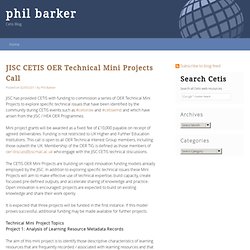

OER infrastructure – discussions with Mimas and NDLR « ALPS CETL Repository Project. As I posted recently over on repositorynews and as ukoer folk will still be aware, from 1st August, Jorum, historically overseen jointly by the national data-centres in Edinburgh (EDINA) and Manchester (Mimas), will be managed exclusively by Mimas and will liaise more closely with the NDLR in Ireland.

Yesterday I took part in a telephone conference organised by the PORSCHE project team with representatives of Mimas, the NDLR and their technical partners Enovation - this post is to summarise the discussion and describe the processes of data transfer required by PORSCHE and ACErep. The primary aim of the PORSCHE project is to provide “seamless access to academic and clinical learning resources to healthcare students”… “establishing the basis for a long term national partnership between the NHS and academia by sharing of appropriately licensed content between Jorum and the NeLR”. To achieve this, PORSCHE has been exploring metadata transfer between the two repositories using OAI-PMH. N.B.
Closing the ukoer circle? « Repository News. The titular Unicycle of our phase 1 ukoer project at Leeds Met referred to “a prototype mechanism for the export and import of open educational resources” that would seek to “share OER materials with…HE community via JORUM”.

To recap, under the ukoer programme, it was mandated that all resources released by an institutional project must also be made available from the national repository service Jorum. The method used by most phase 1 projects was harvest of metadata only by RSS, however, in our case, we were unable to produce an RSS feed in the necessary format and in lieu of OAI-PMH which was not supported by Jorum, the requirement was fulfilled by a full IMSCP transfer – I simply uploaded a zip file of all resources that the JORUM tech folk were able to ingest directly into DSpace. At the time this was seen as the ideal solution for Jorum which, as a “repository”, should seek to preserve actual files rather than just URIs pointing to resources elsewhere. Like this: Like Loading... Open Educational Resources Hack Day. Printer-friendly version Send to friend Kirsty Pitkin reports on a two-day practical hack event focusing on Open Educational Resources (OER), held by DevCSI and JISC CETIS in Manchester on 31 March - 1 April 2011.

OER and Jorum News May11 : Information Environment Team. It’s interesting times in the field of OERs / open content for education.

There have been several key events, from Open Nottingham, Open Course Ware Consortium (OCWC) in the States, and this week is OER11 . There are very lively debates to be had, and a huge amount of experience to be learnt from. Whether you see OER as about open practice or open content, there’s certainly a huge amount of work taking place! I’m pleased to be able to provide some important news and updates that will be of interest to people interested in sharing teaching resources online in FE/HE.
JISC/Academy HEFCE-funded OER Programme HEFCE have written to JISC and the Higher Education Academy asking us to design a third phase of the successful UKOER programme. This request builds on the success of two years of collaborative OER programmes, encompassing more than 80 institutions in more than 50 projects. Developing tools for Open Education at the CETIS OER Hack Day. The OpenSpires Triton team spent a very productive two days working with programmers and developers from around the UK at the recent CETIS OER Hack day.

A range of tools were created in a fast and furious coding and writing bash with colleagues from other OER projects around the UK. The brief for the day was to gather together “software developers, project managers, academics, learning technologists, researchers and users … who are interested in hacking OER content, systems and services. OER Hackday: initial reflections.
On Thursday and Friday CETIS and UKOLN ran OERHack last time I counted we had a little over 250 tweets.

Once we take ‘OERHack’ and RT out of the picture we see: 250 tweets isn’t that many for 2 days and ~40 people but that’s cause everyone was busy Beforehand the event we had some discussions on blogs. OER Hack day Wiki Ideas that we outlined but didn’t develop fully: PORSCHE thoughtsDocument Import/Export ServiceOER Playlist pickerAdditions to OERbitPrototyping a new OERca Things that got hacked (and more or less documented) Extend the utility of WordPress as a host / presentation vehicle for OER collections.
These are described in more detail on the wiki as well as some notes about other things we tested and a useful list of wordpress plugins for learning resources. JISC CETIS OER Technical Mini Projects Call. JISC has provided CETIS with funding to commission a series of OER Technical Mini Projects to explore specific technical issues that have been identified by the community during CETIS events such as #cetisrow and #cetiswmd and which have arisen from the JISC / HEA OER Programmes.

Mini project grants will be awarded as a fixed fee of £10,000 payable on receipt of agreed deliverables. Funding is not restricted to UK Higher and Further Education Institutions. This call is open to all OER Technical Interest Group members, including those outwith the UK. Membership of the OER TIG is defined as those members of oer-discuss@jiscmail.ac.uk who engage with the JISC CETIS technical discussions. The CETIS OER Mini Projects are building on rapid innovation funding models already employed by the JISC. It is expected that three projects will be funded in the first instance. Technical Mini Project TopicsProject 1: Analysis of Learning Resource Metadata Records.